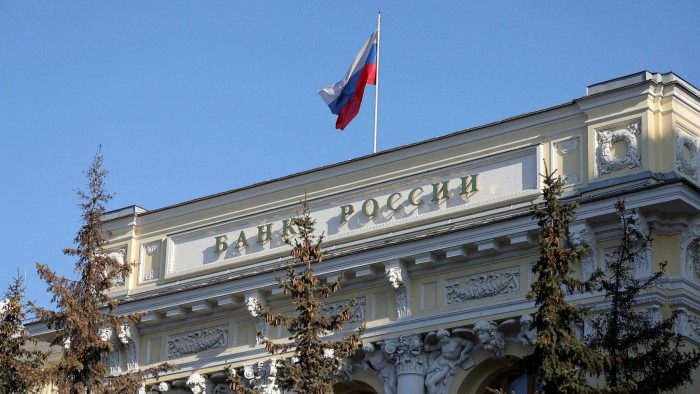The chilling effect of sanctions on Russia

Simply sign up to the War in Ukraine myFT Digest -- delivered directly to your inbox.
Sanctions are blowing holes in the Russian economy. World powers led by the US have imposed curbs ranging from an overseas asset freeze on the Russian central bank to a ban on buying sparkling wine from a bottler in Crimea. On Sunday, US secretary of state Antony Blinken said the allies were now discussing a ban on Russian exports of crude oil
The rouble has collapsed, bond default risk has spiked, the Moscow stock exchange has closed and Russian oil trades at ever-deeper discounts to Brent.
The barbaric invasion of Ukraine fully justifies economic warfare against Russia. Financial sanctions are sometimes dismissed as token gestures. In this case, they are doing real damage and could trigger a recession.
In the process, some fallacies about these curbs have become clear. That should help western banks and businesses stay out of trouble, and developed democracies to deploy new sanctions — which should include the embargo on Russian energy exports — more effectively.
The main fallacy is that sanctions can be targeted at Vladimir Putin and his inner circle of cronies and related businesses. That inner circle is becoming too expansive to merit the description. In the past fortnight, the grouping led by the US, EU and UK added the names of about 400 Russians to sanctions lists, according to World-Check, a risk intelligence database.
The tally of newly sanctioned organisations — most of which are companies — is more than 600. Numerous Russian oligarchs and their companies have been left out, including one particularly glaring example in the UK. But any businesses controlled by sanctioned groups are, by definition, sanctioned too. You have to work out who they are before you can stop dealing with them. This is difficult, given the lack of transparency around Russian companies. The real total would run to several thousand.
Business in corrupt former Soviet regimes is partly organised under the “krysha” principle. The big man in your district typically pays a regional boss to shelter under his metaphorical roof, or “krysha”. The regional boss then remits to a national oligarch who pays protection money to a powerful politician. The dictator sits at the apex of the overlapping roofs.
This is a helpfully flexible system for sanctions-dodging regimes. When sanctions prevent one oligarch or organisation from dealing with the west for the godfather, an unsanctioned stooge may be deputed to do so instead. This is how the Russian central bank could dispose of some of its $160bn in sanctioned gold.
Banks in the City of London and New York cannot be sure who they are dealing with. The result, says the boss of one large City institution, is that “a lot of organisations are simply redlining all Russians”. This is the famed “chilling effect”, whereby most businesses and businesspeople in a country are cold-shouldered alongside named peers.
The chilling effect is particularly icy in the sphere of payments because international banks are rightly terrified of the US authorities. Thanks to their extraterritorial reach and the dominance of the dollar as an international currency, US prosecutors and regulators can make things very hot for banks that participate in sanctions dodging.
Because of the chilling effect, I am told some big international banks are quietly shunning Russian peers who remain on international payments messaging system Swift after the expulsion of seven big lenders, including VTB, VEB and Otkritie. This would make it harder for Gazprombank, the banking arm of gas giant Gazprom and Russia’s third-largest lender, to receive payments.
The fallacy this illustrates is that sanctions can be fine-tuned to spare the Russian energy sector from damage. The US and EU have sought to provide energy companies and their affiliates with a carve-out from sanctions. The reason is that Germany and Italy are heavily dependent on Russian gas as the result of multiple energy policy errors by their politicians. Despite the carve-out, Urals oil is trading at increasingly steep discounts to Brent, reflecting reticence among foreign buyers.
Russian slaughter of Ukrainian civilians obliges the west to intensify sanctions. The US is right to threaten Russia with an oil export embargo. This is better than simply imposing a stoppage on all energy exports without warning.
The case is different to freezing the assets of the Russian central bank. The allies needed to move on this immediately to reduce Russia’s capacity to make precautionary sales of its assets. Gold and bonds represent a stock of value. Oil exports, in contrast, are a continuous flow of income. The west can impose sanctions if Russia refuses to de-escalate and negotiate.
Game theory points to offering Putin exit ramps, as Sven Behrendt of German political consultancy GeoEconomica, points out. Sanctions hawks disagree. But this is always the sensible way to deal with an enemy that you hope to force into retreat rather than destroy. Tactics are needed to win financial wars as well as the military kind.
This article has been amended to reflect talks on an embargo on Russian oil and the impact on markets.
jonathan.guthrie@ft.com
Comments